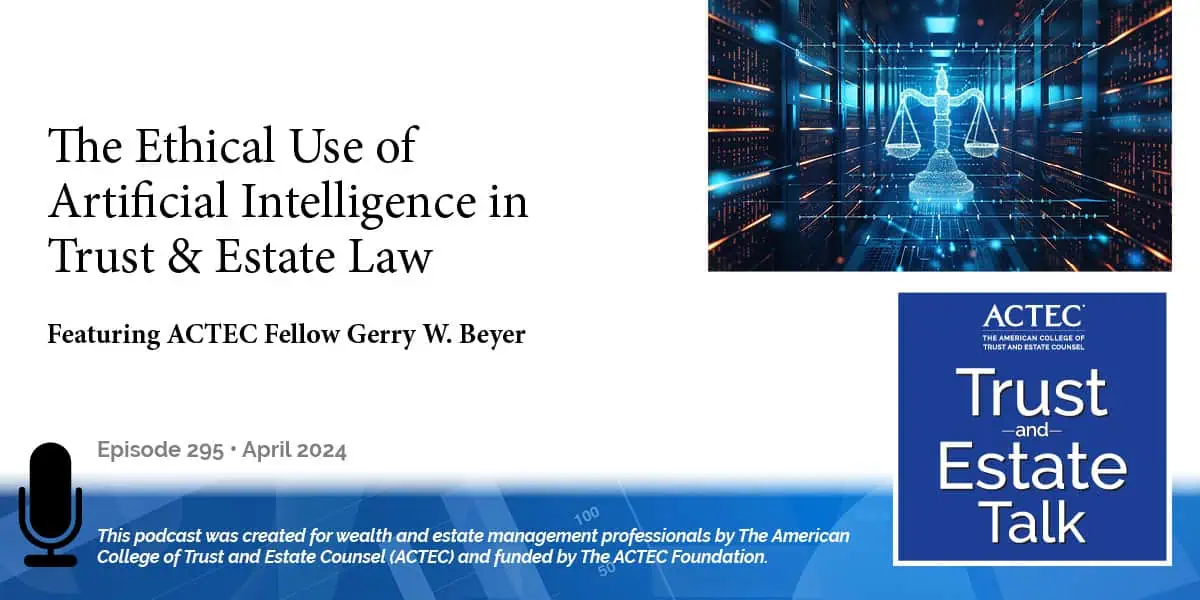A law professor offers insights into the risks, rewards, duties and ethical considerations of lawyers using AI in their T&E practices.

Fellows of The American College of Trust and Estate Counsel (ACTEC) discuss web and technology impacts of topics from electronic wills to securing documents to alternate currencies like Bitcoin.

A law professor offers insights into the risks, rewards, duties and ethical considerations of lawyers using AI in their T&E practices.
A primer on the types and uses of AI, then a deeper dive into the impact on trust and estate law from types to applications to ethical considerations.
A law professor explores the transformative impact of AI in trust and estate Law, delving into ethics, challenges, tips, and trends shaping legal practices.
Explore the best tips for practicing law remotely, ethical duties, work trends and tips post-COVID, with 87% of lawyers now working remotely.
Estate planning and banking investment professionals explain what nonprofits need to understand before accepting donations of cryptocurrency, crypto.
A litigation expert offers best practices for virtual hearings, online legal proceedings and guidance for navigating this relatively new environment.
A trust and estate expert shares the interesting case of a holographic eWill in Mississippi written in the testator’s handwriting on an iPad.
A Pennsylvania Fellows explains the issue of the case of Susan Kittler, who, during COVID in 2021, drafted a will and executed it using an electronic signature.
Lawyers share tips for planning and successfully moving your firm’s data and software to a cloud solution. Understand the benefits and risks in this podcast.
International estate planning experts explain ACTEC’s support of electronic apostilles, e-APPs, and the importance of apostilles to the trusts and estates practice.
A trust and estate expert advises extreme caution when using an e-will or electronic will. Understand why in this podcast.
The foundation of the global financial order is set for significant changes as demand for digital assets and cryptocurrencies upsets governments’ reliance on the dollar.
Expert lawyers discuss the use of electronic signatures and remote notarization in recent Pennsylvania decisions affecting its legal use in wills and documents.
An overview of non-fungible tokens, NFT, for estate planning professionals including creation, management, and protection.
Practical advice from a tech-savvy lawyer for law firms migrating software and data to a cloud server.
An update on electronic wills, remote witnessing, and notarization legislation in Illinois. The act became law on July 26, 2021.
An overview of NFTs, non-fungible tokens, how they work and what do estate planning professionals need to know.
Experts discuss what trustees and fiduciaries need to know regarding cryptocurrency regulation.
The COVID pandemic caused many states to accelerate their laws regarding electronic wills. Learn what’s working and what’s not.
Five reasons why tax and estate attorneys might want to recommend multiple non-grantor trusts for tax benefits for their clients.
What bitcoin investment considerations should estate planners study and what are the fiduciary responsibilities around those investments?
A review of Florida’s Electronic Wills legislation including who’s a qualified custodian of e-wills and what is a vulnerable adult.
A look into video games, online gaming, and how bad actors are using these platforms for money laundering in this evolving and fast moving industry.
Learn about the latest legal developments with regard to the Biometric Information Privacy Act, biometric recognition and an individual’s personal privacy.
An expert on art law, Nicholas O’Donnell, offers his tips and questions to avoid litigation when selling or buying fine art.
Tips that dealers, buyers, and collectors can use to determine their art’s provenance risk exposure.
The conclusion of “Truth, Transparency, and the Right of Privacy.” Duncan Osborne shares his views on balancing attorney-client privilege and an individual’s right to privacy.
Pt. 2 of Truth, Transparency, and the Right of Privacy. Duncan Osborne, a chair of the Financial Action Task Force, shares lessons learned from FATF.
“Truth, Transparency, and the Right of Privacy” – Part 1 – from Duncan Osborne, a chair of the FATF and past-president of ACTEC.
A discussion of how truth, transparency, and an individual’s right to privacy affect attorney-client privilege and the law.
A discussion of the impact of DNA testing on inheritance, intestacy laws, surrogacy, and use of frozen embryos postmortem.
A discussion of The Uniform Law Commission’s new Electronic Wills Act from ACTEC Fellows that chaired the drafting committee.
Lessons learned after a court email of an order goes into a law firm’s spam filter. Understand what email management steps law firms should follow.
Can a person create a valid will that is not formally executed as required by state law? Find out more about electronic wills through discussion of the Horton v. Jones case.
What trust and estate attorneys need to know to keep up with the advances in technology, especially in the area of digital assets is discussed by ACTEC Fellow John Rogers.
Data collection, data scraping, people analytics, UFADA and access to a decedent’s digital assets is the topic of this timely podcast.
Digital will, electronic will, e-will… no matter what you call it, practitioners will be confronted with this new type of will in the very near future. Learn more in this podcast.
The GoFundMe Revolution: What Happens Once the Money Has Been Raised? Individual fundraising has gone digital and the funds raised are exponentially greater than in the past, however, the legal tax and fiduciary issues facing the money raised remain murky and largely unregulated.
Do practicing lawyers have ethical and legal duties with the use of technology in the practice of law? ACTEC Fellows discuss protecting client information and ethical responsibility.